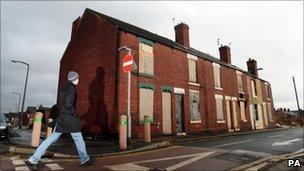Home repossessions fell by 24% in UK during 2010
- Published

Lenders fear repossessions may start to rise again this year
The number of homes repossessed in the UK last year dropped by 24% to 36,300, the Council of Mortgage Lenders (CML) has said.
The number of people in arrears by 2.5% or more of their outstanding loans also fell last year, by 13% to 169,600.
The continued low level of interest rates has helped many home owners in financial difficulties.
However, the CML repeated its warning that arrears and repossessions may rise this year.
"As we go through 2011, the number of people facing payment pressures may increase if interest rates rise, and as a result of the spending cuts that have resulted in reductions in the level of public support available," said the CML's director general Michael Coogan.
"We will be monitoring developments closely, but at present we continue to expect the number of arrears and repossessions to be in line with our forecasts of 40,000 repossessions and 180,000 arrears cases as at the end of 2011."
'Seek advice'
As well as the possibility of higher interest rates, the CML pointed to other potential pressures on people struggling with their mortgages.
The government Support for Mortgage Interest scheme, aimed at subsidising the interest payments of mortgage holders who become unemployed, now makes payments assuming that mortgage rates are 3.63%, rather than the previous rate of 6.08%.
"Anyone who is worried about being unable to pay their mortgage should contact their lender and seek advice at an early stage from Citizens Advice, Shelter, National Debtline or other local advice agencies," said Mr Coogan.
The number of repossessions has been falling for more than a year and the 7,900 drop in the last quarter of 2010 was the fifth quarterly fall in a row.
With many people enduring pay freezes while the rate of inflation rises, and unemployment expected to increase due to government spending cuts, many experts believe some mortgage holders could quickly be tipped over the edge.
David Birne, insolvency partner at chartered accountants HW Fisher, said: "When rates do rise, and inflation may force the Monetary Policy Committee's hand sooner rather than later, the number of repossessions and people in arrears could spike sharply."
Hardcore problem
Despite the overall downward trend in repossessions, the CML's figures , externalreveal that there is still a persistent hardcore of borrowers whose finances are not improving.
The number of people with the biggest arrears - 10% or more of their outstanding loan - were the only group whose numbers grew in the last quarter, by 700 to 27,400.
This was the fourth successive quarterly increase in the number of these particularly distressed borrowers.
The CML said that while some of them may have stabilised their finances, they were also not able to improve them, making the borrowers extremely vulnerable to any change in their circumstances.
Court orders
However other figures, from the Ministry of Justice (MoJ), suggest that lenders have in recent months been been pursuing fewer borrowers through the courts in England and Wales.
In the last three months of 2010, 17,847 county court actions were started for repossession, 12% fewer than in the third quarter of the year.
The number which were successful in leading to a court order for repossession also fell, down by 9% to 13,937.
Of those, nearly half were suspended to allow the borrower time to make some repayments.
"There is help available and repossession should only ever be the very last resort," said Housing Minister Grant Shapps.
"No one in financial difficulty should be embarrassed to seek help if they need it and worried homeowners should speak to their mortgage lender immediately."